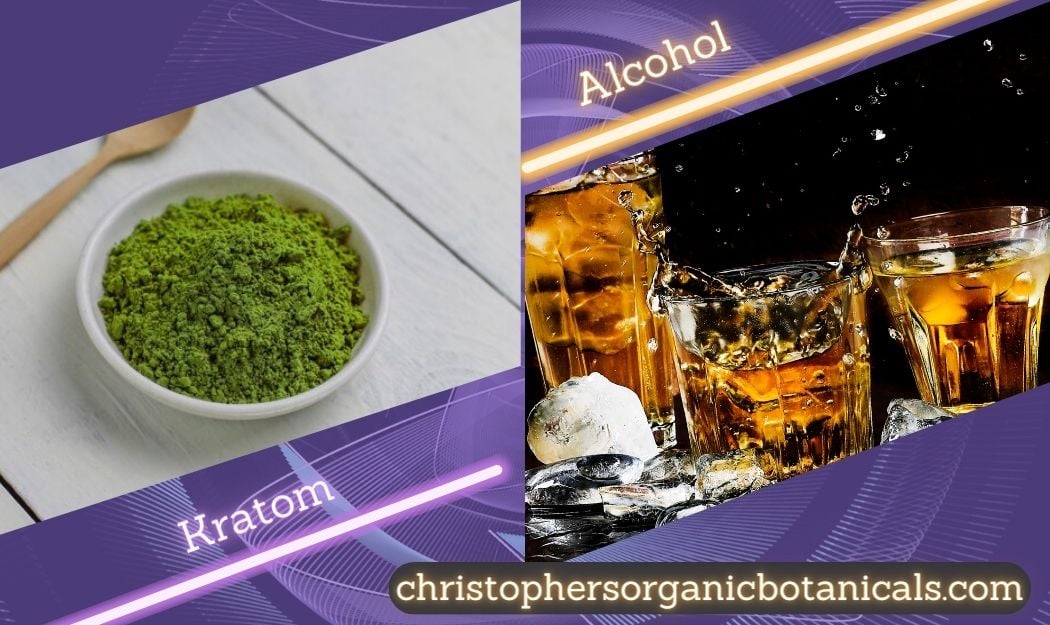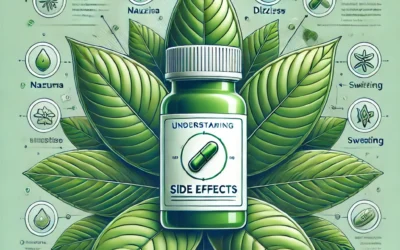Can you mix kratom and alcohol?
Alcohol and kratom are both substances that have an impact on the central nervous system, but they do so in different ways and possess unique characteristics. So we ask the question? Can you mix kratom and alcohol?
Alcohol, also known as ethanol, is a depressant that affects the brain by slowing down its activity. It is commonly consumed in the United States in the form of alcoholic beverages and is known for its ability to induce relaxation, reduce inhibitions, and impair cognitive and motor functions. Alcohol acts on various neurotransmitters in the brain, such as gamma-aminobutyric acid (GABA) and glutamate, leading to its sedative effects. However, drinking alcohol in excess can result in negative consequences, including liver damage, addiction, alcohol dependence and impaired judgment.
On the other hand, kratom is a tropical tree native to Southeast Asia, and its leaves contain active compounds that can enhance mood. The primary active ingredients in kratom are mitragynine, which interact with receptors in the brain.
Kratom is often consumed by chewing the leaves, brewing them into a tea, or taking it in capsule or powder form. It is known to provide increase energy and focus, and enhance mood. However, kratom users can also develop a habit and experience various side effects, such as nausea, and constipation.
When considering the combination of kratom and alcohol, it is essential to be aware of several factors. Firstly, alcohol has the potential to impair cognitive and motor functions, so combining them can intensify these effects and increase the risk of accidents or injuries. Additionally, both alcohol and kratom can cause dehydration, so it is crucial to stay hydrated when consuming them together. Moreover, the sedative effects of alcohol may mask the energetic effects of kratom, leading individuals to consume more kratom than intended, which can result in adverse effects.
Furthermore, the combination of alcohol and kratom, like many other substances, may put additional strain on the liver, as both substances are metabolized by this organ. Excessive or prolonged use of alcohol and kratom can lead to liver damage or other complications. It is also important to note that the effects of combining alcohol and kratom can vary depending on individual factors such as tolerance, body weight, and overall health.
Effects of Alcohol
Alcohol, when consumed, affects various systems within the body and can produce a wide range of effects, both short-term and long-term:
Short-Term Effects of Alcohol
1. Euphoria and Relaxation: Initially, alcohol can induce feelings of relaxation and euphoria.
2. Impaired Judgment: As blood alcohol concentration rises, cognitive abilities decrease, leading to poor decision-making.
3. Lowered Inhibitions: Alcohol can make individuals more outgoing or daring, leading to behaviors they might avoid when sober.
4. Coordination Issues: Motor skills become impaired, increasing the risk of accidents.
5. Blurred Vision and Slurred Speech: Common physical signs of intoxication.
6. Memory Impairment: Blackouts or lapses in memory can occur.
7. Reduced Core Body Temperature: Alcohol can cause blood vessels to dilate, leading to heat loss.
8. Respiratory Depression: In excessive amounts, alcohol can slow or stop breathing.
9. Vomiting: Alcohol can irritate the stomach lining and cause vomiting, which increases the risk of choking.
10. Loss of Consciousness: In high doses, alcohol can lead to unconsciousness or even coma.
Long-Term Effects of Alcohol
1. Liver Damage: Chronic alcohol consumption can lead to fatty liver, alcoholic hepatitis, fibrosis, and cirrhosis.
2. Brain Damage: Prolonged alcohol use can result in permanent brain damage, affecting memory, coordination, and overall cognitive function.
3. Digestive Issues: Alcohol can lead to gastritis, ulcers, and pancreatitis.
4. Cardiovascular Problems: Chronic drinking increases the risk of high blood pressure, heart disease, and stroke.
5. Mental Health Disorders: Alcohol abuse can increase the risk of depression, anxiety, and other mental health disorders.
6. Weakened Immune System: Regular alcohol consumption can weaken the immune system, making the body more susceptible to diseases.
7. Addiction: Over time, individuals may have a risk of developing an alcohol use disorder or substance use disorder from heavy drinking, characterized by a strong craving, loss of control, and physical dependence, or high tolerance.
8. Increased Risk of Cancer: Chronic alcohol use is linked to an increased risk of several cancers, including mouth, throat, esophagus, liver, breast, and colon cancer.
9. Bone Damage: Alcohol can interfere with the production of new bone, leading to decreased bone mass and increased risk of fractures.
10. Sexual and Reproductive Health: Alcohol can lead to reduced libido, impotence, and infertility.
It’s essential to consume alcohol in moderation and be aware of its effects on the body. The definition of “moderation” can vary based on individual tolerance, age, gender, and other factors. If someone believes they have a problem with alcohol, they should seek professional help.
Effects of Kratom
Kratom, derived from the leaves of the tropical tree Mitragyna speciosa native to Southeast Asia, has been traditionally used for its stimulant and relaxing effects. The effects of kratom can vary based on the dosage and strain. Here’s an overview of the potential effects:
At Low to Moderate Doses
- Stimulation: Kratom can produce stimulant effects similar to caffeine, leading to increased alertness, energy, and sociability.
- Enhanced Mood: Users often report feelings of an uplifted mood.
- Increased Concentration: Some users claim enhanced focus and mental clarity.
- Decreased Appetite: Some users experience a reduction in appetite.
- Increased Libido: Kratom may increase sexual desire in some individuals.
At High Doses
- Tolerance: Tolerance to kratom may become an issue if over consumption is an issue.
- Sedation: At higher doses, kratom can produce sedative effects.
- Good Mood: Some users experience heightened mood sensations.
- Drowsiness: Users may feel sleepy or overly relaxed.
Potential Side Effects
- Nausea and Vomiting: Some users experience gastrointestinal distress after consuming kratom.
- Constipation: Chronic use can lead to constipation.
- Dependency: Regular use can lead to dependency.
- Dry Mouth: Users may experience a notably dry mouth after ingestion.
- Weight Loss: Chronic use can result in weight loss due to decreased appetite.
It’s essential to approach kratom with caution, especially given the variable legality and limited research on its long-term effects. If someone is considering using kratom, they should consult with a healthcare professional and be informed about the associated risks and potential interactions with other substances.
Alcohol and Kratom Combination
Combining alcohol and kratom is not advisable. Here are 7 reasons why:
- Potentiation of Effects: Both alcohol and kratom are central nervous system depressants. When combined, they can enhance each other’s depressant effects. This can lead to increased sedation, dizziness, and respiratory depression, which can be dangerous.
- Impaired Judgment and Coordination: Alcohol can impair judgment and motor coordination. When combined with kratom, this impairment could be amplified, increasing the risk of accidents or injuries.
- Gastrointestinal Issues: Both alcohol and kratom can cause gastrointestinal upset in some individuals. The combination could increase the risk of nausea, vomiting, or other digestive disturbances.
- Potential for Overconsumption: Under the combined effects of alcohol and kratom, one’s judgment about how much to consume can be impaired, leading to potential overconsumption and increased risks.
- Increased Risk of Dehydration: Both substances can lead to dehydration. When combined, the risk is heightened, which can have negative effects on the kidneys and other organs.
- Unpredictable Interactions: The combined effects of alcohol and kratom are not thoroughly studied, and individuals might react differently to the combination. What might be tolerable for one person could be dangerous for another.
- Liver Stress: Both substances, like many, are metabolized in the liver. Combining them can increase stress on the liver, especially with regular or excessive consumption.
It’s essential always to exercise caution when considering the combination of substances. If someone is thinking about mixing alcohol and kratom or any other substances, it’s crucial to consult with a healthcare professional to understand potential risks. Additionally, remember to be aware of the legal status and potential health implications of any substances you are considering.
Conclusion
When using any substance, like medicine, drugs, or natural remedies, it’s crucial to be careful. This means knowing the dangers and possible negative effects of the substance and taking steps to stay safe.
One particular aspect that requires extra vigilance is the combination of substances. When two or more substances are taken together, they can interact with each other. These interactions can have various effects on the body, ranging from mild to severe. Some interactions may enhance the effects of the substances, leading to an intensified response, while others may diminish the effectiveness or even cause harmful reactions.
The risks associated with combining substances can be particularly dangerous when it involves medications. Certain medications may have specific instructions or warnings regarding their use in combination with other substances. This is because the combination can alter the way the medication works, potentially reducing its efficacy or causing adverse effects. It is crucial to consult with healthcare professionals, such as doctors or pharmacists, before combining medications to ensure that it is safe and appropriate.
Furthermore, the risks of combining substances are not limited to medications alone. It is equally important to exercise caution when combining drugs or even herbs.
Some drugs, when taken together, can have synergistic effects, meaning that their combined action can be more potent than when taken individually. This can increase the risk of overdose or other harmful consequences. Similarly, natural remedies, such as herbal supplements, can also interact with medications or other substances, leading to unexpected effects.
To mitigate these risks, it is always advisable to consult with healthcare professionals before using or combining substances. They have the expertise and knowledge to assess the potential interactions and provide guidance on the safest course of action. Healthcare professionals can review an individual’s medical history, current medications, and any other relevant factors to make informed recommendations.
In conclusion, approaching the use of any substance with caution is essential for ensuring one’s safety. This includes being aware of potential interactions and risks associated with combining substances. Consulting with healthcare professionals is crucial in making informed decisions and minimizing the potential harm that can arise from substance use or combination.
Alcohol and kratom have distinct effects on the central nervous system and possess unique characteristics. Combining these substances can have amplified effects and potential risks, including impaired cognitive and motor functions, dehydration, liver strain, and other adverse effects. It is crucial to exercise caution!






0 Comments